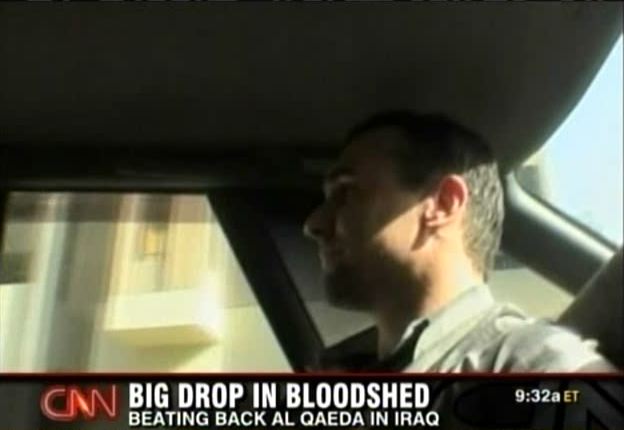NR: New version of last night's report

Length: 4:39
LARGE (54.6 MB) ----- SMALL (5.4 MB)
MICHAEL WARE, CNN CORRESPONDENT (voice-over): The U.S. military's success in Iraq is spectacular. Insurgent attacks are back to levels not seen since nearly two years ago before the Samara shrine bombing sparked the civil war. Much of the success comes from U.S. military alliances with men like these: Sunni insurgents protecting villages and neighborhoods like here in Fadhil in Baghdad's heart. Across the capital, the result is that civilian deaths have dropped by a remarkable 75 percent. Yet, Baghdad remains a dangerous place. The city carved into sectarian enclaves, where crossing the dividing lines, as we're doing today to reach Fadhil, can be deadly.
(on camera): Is this Haifa Street?
(voice-over): With loyalties so fluid, we thread our way through rival militia checkpoints and pass undetected through Iraqi army positions; undetected because you can't be sure whose side anyone is on. But we make it to Fadhil. The latest neighborhood where insurgents now allied to America have driven out al Qaeda and we find life is returning to normal. It's a stunning transformation, because weeks ago, al Qaeda ruled here with vicious efficiency. Marking the homes of families to be punished. Men to be killed, homes to be burned.
(on camera): So, from al Qaeda, this is like a mark of death.
UNIDENTIFIED MALE: His family, not good here.
WARE (voice-over): Some deemed not good by al Qaeda were led up this winding alleyway to a make-shift torture chamber. Mutilated bodies were dumped in rubbish heats or in this fetid water.
(on camera): And what would have happened to me on these streets when al Qaeda was here?
(voice-over): My body would have been fed into a meat grinder, this Sunni militia commander tells me. Then, al Qaeda would have asked CNN and my country for millions of dollars. The scars of the close quarters combat it took for the Sunni concerned citizens to drive out al Qaeda are fresh.
(on camera): But look at all the bullet holes even in the school.
(voice-over): But the dramatic change here, the drop in bloodshed, seems fleeting...
(on camera): This is all from the fighting, yes?
(voice-over): ...almost ephemeral. Why? Because without reconciliation among the religious sects themselves, it cannot last; and that feels a long way off. Everywhere in Fadhil, there are memorials not only to those murdered by al Qaeda, but also those killed by Shia militia and government death squads. The same alliance with the Sunni sets uprooted al Qaeda has also seen the U.S. side with groups ready for another fight against the Iraqi government and any Iranian influence.
(on camera): Do you think this government will ever be able to embrace the Sunni groups?
(voice-over): The government is not loyal to its country says this U.S.-backed Sunni commander. They are supported by the intelligence service of a neighboring country. This, he says, is the abyss.
(on camera): Who will you be fighting when the Americans leave?
(voice-over): And when American troops finally do leave Iraq, the commander knows who he will be fighting.
(on camera): We're talking about this government?
(voice-over): It's this government and the people they are loyal to, he answers. And this commander doesn't see much hope for reconciliation either. Everybody knows militias and Iranian agents are inside the government and inside the Iraqi Security Forces, he says. They cannot work with us. He even claims Iraqi soldiers actually fired at his men as they fought al Qaeda.
(on camera): A convoy.
(voice-over): So with the sudden arrival of a military convoy, the tension rises.
(on camera): Is it an American convoy, or Iraqi?
(voice-over): Who is it...
(on camera): It's Americans? Then we can film.
(voice-over): ...and can they be trusted?
(on camera): Is it Jaish American or Jaish Iraqi?
UNIDENTIFIED MALE: No, it's an American.
WARE (on camera): Get out of the way. If it's American, we should be fine. How does he feel? Nervous?
(voice-over): It is an Iraqi army convoy led by a brigadier general. The government has ordered we ask the Sunni elements to join the police and army, he says, because we don't want the security institutions controlled by one sect.
But as we get ready to leave, the Sunni commander escorting us to leans into the car, telling me he does not trust the offer. The mistrust is shared on all sides and deeply troubles America's commanders, for they know they cannot return home if Iraq cannot make peace with itself.
Michael Ware, CNN, Baghdad.
